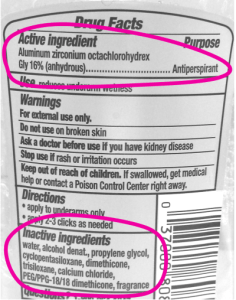Chemicals In Personal Care Products Bring About Early Puberty in Girls
There are several animal studies linking phthalates, parabens, and other personal care product chemicals to endocrine disruption, and a study published in the journal Human Reproduction shows that humans are not exempt from that group. Researchers from the University of California, Berkeley looked at 338 children from birth to adolescence, obtaining urine samples to determine chemical levels and looking for signs of puberty development at nine-month intervals from the age of nine. The study shows that every time a mother’s phthalate levels doubled in concentration, their daughters grew pubic hair 1.3 months earlier than expected. Kim Harley, lead author of the study and associate director of the Center for Environmental Research and Children’s Health at the University of California, Berkeley says,
There has been considerable concern about why girls are entering puberty earlier and hormone disrupting chemicals like the ones in personal care products that we studied have been suggested as one possible reason…”
Endocrine Disruptors
Many of the chemicals measured in this study are known endocrine disruptors. Phthalates, parabens, and triclosan have all been found to have numerous negative effects on the body, and they’re very stable. This study found that endocrine disruptors measured while a child was still in utero had a link to abnormal hormonal events occurring a decade later. The chemicals are also measured in tiny amounts, parts per billion, indicating that a little goes a long way (or causes a lot of damage). Here’s a look at where to find these chemicals and why you should avoid them.
Related: How to Detox From Plastics and Other Endocrine Disruptors
Phthalates
Phthalates are nearly impossible to avoid. This group of chemicals is used to make plastics more flexible, and in addition to being present in virtually every type of plastic packaging, you can also find phthalates in computer cords, toys, cars, personal care items, detergents, and flooring. Phthalates are also found in various foods, though oils, dairy, and meat (especially chicken) have consistently registered high levels of the chemicals.
This is bad news for the endocrine system. It’s also a potential factor in other health problems. A 2014 study from researchers at Columbia University found a marked increase in asthma among children exposed to large concentrations of phthalates in the womb. Phthalates have also been linked to attention-deficit hyperactivity disorder, breast cancer, obesity, diabetes, neurodevelopmental issues, behavioral issues, and autism spectrum disorders.
Parabens
Parabens are used in preservatives, and you’ve probably seen them in the ingredient list of products like deodorants, shampoos, lotions, and other personal care products. Many conventional products have more than one type of paraben. These chemicals effectively prevent the growth of bacteria and are also used to preserve food and beverages like beer, sauces, desserts, sodas, processed fish, jams, pickles, frozen dairy products, processed vegetables, and flavoring syrups. A study conducted in Albany, New York in 2013 collected a range of food samples and found parabens in 90 percent of them.
The biggest controversy regarding parabens and health has to do with the chemical’s classification as xenoestrogens. This means they imitate estrogen in the body. This, in turn, disrupts the endocrine system. While a 2004 study in the U.K. that found parabens in malignant breast cancer tumors was hotly disputed, a more recent study (2015) from the Silent Spring Institute and the University of California Berkeley also suggested a significant link between parabens and cancer cells. Dale Leitman, a gynecologist and molecular biologist at UC Berkeley, is the study’s lead investigator.
Although parabens are known to mimic the growth effects of estrogens on breast cancer cells, some consider their effect too weak to cause harm…But this might not be true when parabens are combined with other agents that regulate cell growth.”
Related: Holistic Guide to Healing the Endocrine System and Balancing Our Hormones
Triclosan
Triclosan is an antibacterial and antifungal chemical that’s frequently added to soaps, toothpaste, toys, kitchen materials, yoga mats, cosmetics, and athletic clothing. Interestingly, the chemical was initially registered as a pesticide at its introduction in 1969. Until 2016, it could also be found in hand sanitizers. Triclosan has since been banned for use in sanitizer products by the Food and Drug Administration. That ban has not stopped the public from being exposed to triclosan through a myriad of other means.
The antibacterial qualities of triclosan disrupt gut bacteria, and the chemical has been linked to chronic colon inflammation and colon cancer. It’s also been shown to alter hormone regulations in animal studies. This new study indicates that triclosan behaves the same way in humans as well.
New Normal
You can try your best to avoid these chemicals. This involves avoiding all plastics, anything that came into contact with plastics, any products with artificial fragrances, filter all of the water in your house, avoid food sprayed with any kind of chemicals, and stay away from any and all Bisphenol products, among other things. Unfortunately, the only way to accomplish a few of the items on that list requires checking out of modern life. All of this poses a huge challenge for understanding puberty – what do we do when what we know changes?
Sources:
- Chemicals in cosmetics, soaps tied to early puberty in girls – Reuters
- Association of phthalates, parabens and phenols found in personal care products with pubertal timing in girls and boys – Human Reproduction
- Chemicals in some household plastics linked to child asthma risk – The Guardian
- How to Detox From Plastics and Other Endocrine Disruptors – Organic Lifestyle Magazine
- 10 Surprising Places You Can Find Phthalates – Naturally Savvy
- Lotion ingredient paraben may be more potent carcinogen than thought – Berkeley News
- Triclosan could be really harmful to your gut, and it’s probably in your toothpaste – LA Times
